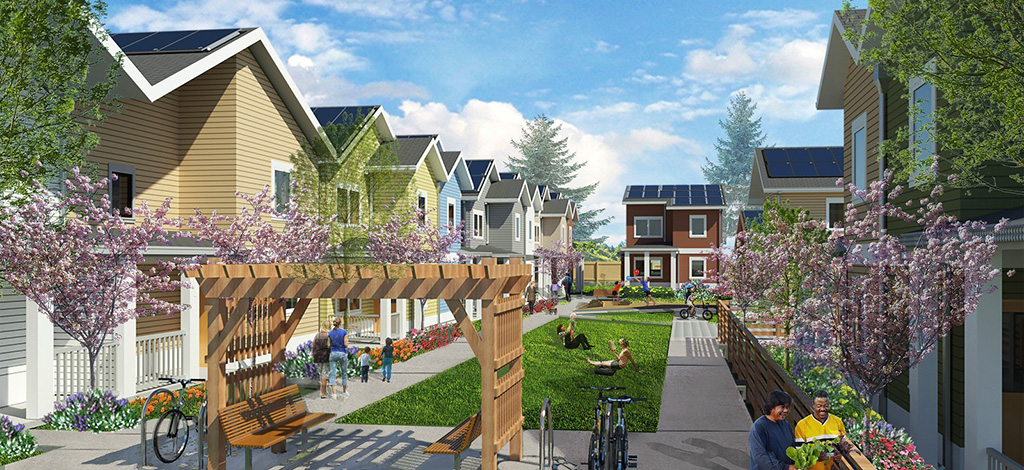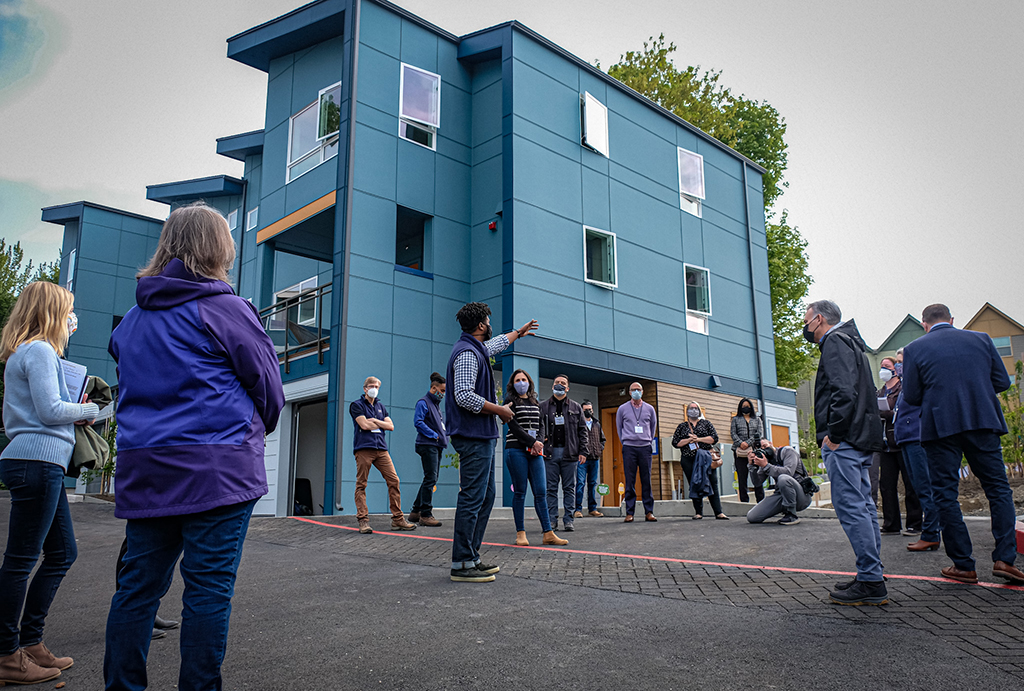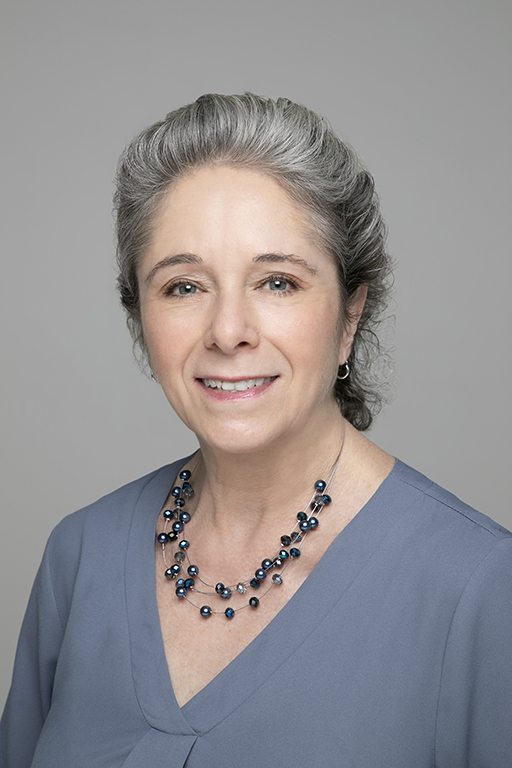By Kai Curry
NORTHWEST ASIAN WEEKLY
Community land trusts started during the Civil Rights Movement to protect southern Blacks from being displaced from their homes. Different from other affordable housing models, community land trusts allow for permanent home ownership on land held “in trust” by a nonprofit. Homestead Community Land Trust (Homestead) of Seattle has 245 homes in trust in Seattle and surrounding cities—and plans for many more. Generous donations of land, property, or funds, such as a recent gift of $10 million from Mackenzie Scott, help Homestead realize their mission of “equity, stability, and opportunity” for low-income households.
“The model has stood the test of time,” said Kathleen Hosfeld, CEO and executive director of Homestead. “Wherever you pick this model up and put it, it still works” and keeps homes affordable “generation after generation.” Homestead has homes in Seattle, Renton, Burien, and Lake Forest Park, with new projects pending in Tukwila, and on land recently donated by the Admiral United Church of Christ. Literally anyone can donate. Admiral United turned the downside of a reduced congregation into an opportunity for Homestead to build new homes on land the church no longer needs. Marty McLaren, a beloved resident of Puget Ridge Co-Housing, gave her Delridge home in trust to Homestead as part of a dying wish as she was passing from cancer.
“Everyday people [are] using the assets that they have to address the affordable housing crisis,” Hosfeld explained. Scott, McLaren, Admiral Church, and Homestead itself have all come to the conclusion that a community land trust is a better long-term solution to the nation’s housing crisis than syndicate-built high-rises popping up all over and destroying a sense of community.
Here’s how it works. Homestead holds a parcel of land “in trust.” On this land they build (or there is already) a home. Homestead absorbs the cost of the land and subsidizes the cost of the home to keep the sale price within the range of applicants whose yearly income amounts to less than 80% of the area average. What this means is that people can live in the same place where they work. It means they and their children benefit from a better quality of life because they have stability. It means safer neighborhoods because people’s lives are less in flux. It means combating gentrification.

Artist’s rendering of Homestead’s upcoming project in Tukwila. (Image courtesy of Homestead Community Land Trust.)
“Close to 60% of the heads of household in our program are people of color,” Hosfeld said, which compares to “a 26% ownership rate by people of color in King County.” Skyrocketing housing prices have forced more and more people to move far from their jobs.
“People who are shut out of homeownership today are people who contribute to everybody’s quality of life. It’s your child’s teacher…It’s the person who restores power after a storm. It’s the person who takes care of your aging parent in the assisted living facility, [or] the person that takes your blood when you go in for a doctor’s appointment.” Homestead operates within the recognition that home ownership in most of the United States, and certainly in King County, has become “fundamentally unfair to the everyday people that make communities work and run.”
Homestead occasionally runs into prejudice when existing residents hear “affordable housing” is going to be offered in their neighborhood. The term covers many housing types, and people get the wrong idea because a “for sale home is a different situation than somebody in a shelter [or] coming off living on the streets.” Solutions come in many forms.
“Once they learn that it’s ownership, and once they learn more about our program, usually they [say], ‘Of course, I want to have my kid’s teacher live near the school where she works. Why would I not want that?’”
“In a perfect world,” Hosfeld said, “you want a spectrum of incomes…Once you put land and homes in a community land trust, it stays affordable to the income category that we serve.” It creates “a permanent address for affordability,” she continued, which means that “in those neighborhoods, there will always be a place for people of that income.”

King County Executive Dow Constantine (right, black jacket) touring Homestead’s Willowcrest in Renton. (Photo courtesy of Homestead Community Land Trust.)
One of the ironies of Homestead’s existence is that they do not have any land in Seattle’s Chinatown, which is where they have their office.
“The International District (ID) is experiencing displacement. We would love to be able to bring our work home to this neighborhood.” Hosfeld described the irreplaceable essence of the neighborhood, such as the “smell of produce” in the bins on South Jackson. “The International District is magical.” She echoed a feeling of many Seattle-ites who remember when Seattle was composed of what they called villages, where everyone knew each other and could look out for each other. In spite of efforts to build it up in other ways, the ID still has this quality, Hosfeld insisted.
“I see little kids waiting on the corner for their school bus to pick them up in the morning. I love that. There’s nothing more residential than that, right? Most of those folks who grow up in the International District, if they want to buy a home, they have to move out. Wouldn’t it be great if the people who are raised there could stay in the community?” Multiply that times all of Seattle’s neighborhoods.
Mackenzie Scott’s donation will fuel this dream of home ownership for all. As will the other generous gifts that Homestead has received and will receive when more people understand the value of the community land trust model. Of Scott, Hosfeld said, “She’s part of what they call the next-gen philanthropic donor,” meaning young people who have wealth and want to invest differently than their elders traditionally did, when they chose national charities or the arts. “These younger philanthropists have discovered that it is community-based solutions, like community land trusts, where there’s grassroots activity,” a way to “change the system to make it more equitable.”
“Once you put land and homes in a community land trust, they stay affordable to the income category that we serve,” Hosfeld said. “Wherever the homes are located, that means in those neighborhoods, there will always be a place for people of that income. That’s what you want.”
Kai can be reached at info@nwasianweekly.com.




